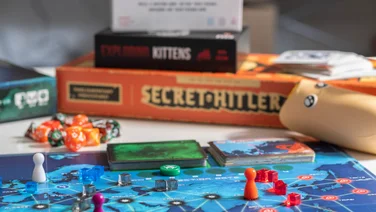To help us provide you with free impartial advice, we may earn a commission if you buy through links on our site. Learn more





Civilization V roughly follows the same plot of the games before it. In it you take control of a nation (England, America, Rome and so on) controlled by a famous historical figure (Queen Elizabeth I, George Washington, etc.) and guide it from prehistory to the future. Along the way, it’s your job to control interactions with other nations as you attempt to win the game.
While the plot and mechanics haven’t changed that much, Civ V still manages to feel fresh and different. In part, it’s because the game, as with its predecessors, uses a turn-based game engine, rather than the real-time free-for-all employed by other games. However, the main reason that it still feels different is because there are several ways to win the game.

There’s the old-fashioned way of raising a massive army and capturing every other nation’s capital city, which is certainly fun, but it’s the other ways to win that make the game: you can be the first nation to launch a spaceship; you can create the United Nations and have peace; or you can create the Utopia project by implementing a set number of social policies.
Regardless of which method you go for, part of the fun of Civilization is that you get to interact with the other nations sharing the same map, discussing matters with the famous head of state. This can be for good, such as developing technology together, or for bad, by demanding a payment of gold from them or getting them to let your troops through their territory.
How you play the game affects how your neighbours view you, and complex diplomacy means that attacking a weak nation isn’t always the best plan, as you can provoke a larger nation into starting a war with you.

As with previous games, Civlization V is a turn-based strategy game. This means that in each turn, your units can only perform a set number of actions, such as moving a specified distance. The clever part of the system is that it’s a simultaneous turn-based game, so everyone gets a chance to make their moves at the same time with the first action made carried out first. This means that at certain points, moving key units first gives you a tactical advantage, so it can be important to be quick.
Some updates to the game are that the map is now split into hexagonal tiles, rather than square ones. In practice this has very little impact on the game. A bigger factor is now that two units can’t occupy the same tile. This makes a huge impact on warfare, as you have to employ better tactical planning in order to attack a city, rather than relying on overwhelming force with a tile stacked to the hilt with tanks.
Cities can now defend themselves, although you can still garrison units in a town to offer better protection if you want. This makes attacking a harder option and means that another route to victory could be preferred.

Cities are one of the most important resources on the map, as they’re the way that you construct new units and buildings. To build you need to manage your resources carefully. So, in order to create certain units, such as mounted troops, you need to have enough horses, which means carefully expanding your territory (by buying new hexagons or expanding naturally) carefully to make sure that you’ve got enough pastures. Other resources, such as metal and farms for food, have to be managed in much the same way.
The more cities you have the more things you can have in production in any one go. You can either build new cities yourself by creating Settler units, or by taking over another nation’s city in one of two ways: a puppet state, where you have no control over what it produces, or by annexing them and taking over complete control of production.

However, annex a city and your population takes a big hit on happiness. So, to progress, you then need to build the right kinds of things to improve happiness, such as court houses and entertainment venues, rather than focussing on building other things to improve your civilization.
On top of all this you have to carefully pick your research projects, which take a set amount of turns to complete. These can improve your civilization and make it more knowledgeable, or gain you better technology, such as ships with which to cross the ocean or more advanced units with which to fight with. Play the game right and you can drive a fleet of tanks into a civilisation protected by just bows and arrows.
However, carefully balancing your research projects and units has to be carefully managed, as there’s nothing more annoying than going to a path of domination, picking the wrong research projects and getting beaten into space by a neighbour before you’ve had time to capture all of the capital cities.
Then there are all of the host nations you can play. Each one has its own special units and abilities, meaning that there’s plenty of scope to keep playing the game, changing civlizations each time you go.
If this all sounds a bit complex, it’s because it is. However, the brilliance of Civilization is that it manages to make complexity easy to deal with. Regular pop-ups let you know what’s going on, while your different advisors help shape your policy and tell you what you should be building or researching. Because the game starts in pre-history, you’ve got a good few turns of just building your city and keeping your people fed to get used to the controls and system before the game starts for good.
Should you get bored of playing the game against the computer, there’s a brilliant multi-player mode. This replicates the single-player game, but gives each player his own nation to control instead. Here, the simultaneous turns take a real meaning: the player that inputs commands first, gets the actioned first. In other words, if you’re in the middle of combat, you need to be quick to keep the advantage.
The graphics on full detail settings look fantastic, with the fog of war that prevents you seeing parts of the map you haven’t visited taking on the appearance of fluffy white clouds, and the sea is a deep rippling shade of blue-green. Units look fantastic, too, and you can zoom the camera right in to see them in their full detail.
The beauty of Civlization V is that there are so many ways to play it and so many ways to win (or lose). It keeps you coming back for more and sitting down to have a quick game soon turns into a few hours where you keep saying to yourself, “just one more turn”. If you like your games to have a bit more thought, this is the strategy game to buy.
| Details | |
|---|---|
| Price | £30 |
| Details | www.civilization5.com |
| Rating | ***** |






